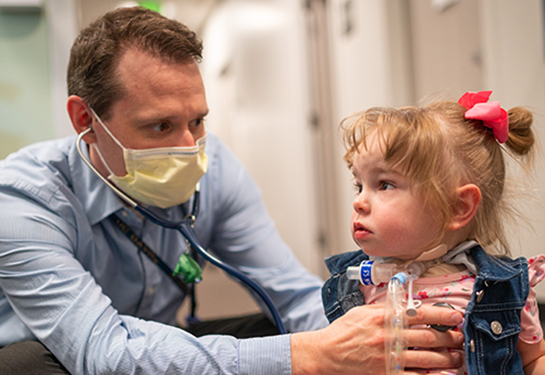Perinatal, neonatal and opioid use disorder specialists share expertise with rural providers
Team from Health Resources and Service Administration visits to see program in action
For the past three years, perinatal, neonatal and opioid use disorder specialists at UC Davis Health have worked with rural hospitals and community partners through telehealth to share recommendations and best practices. This is conducted as part of the Optimizing Pregnancy and Infant Outcomes in Substance Use Disorder (OPIOID) and Neonatal Abstinence Syndrome (NAS) research project at UC Davis Health.
The project’s goal? To keep mothers with opioid use disorder and their opioid-exposed infants together in their home communities to decrease social and emotional stressors and give families the healthiest start.
Funding for this project is provided through a grant from the Neonatal Abstinence Syndrome (NAS) Program administered by the Federal Office of Rural Health Policy (FORHP) in the Health Resources and Services Administration (HRSA).
A team from HRSA recently visited to see this research project in action during a monthly clinic session. The goal was to understand the impact it has made in Northern California and to share their work with other HRSA grant recipients.
During the session, providers presented de-identified patient cases to a consortium of providers who shared recommendations on caring for and managing patients with complex conditions. These discussions were supplemented with short didactic presentations to improve knowledge and share evidence-based practices.
“Our rural health care partners have attested to having more clinical skills and feeling more confident in caring for these patients, in reducing stigma and bias in their hospitals, and supporting infants through withdrawal symptoms utilizing the eat, sleep and console protocol for infants with neonatal abstinence syndrome,” said Kara Kuhn-Riordon, UC Davis neonatologist who has led this project with maternal-fetal medicine physician Shannon Clark.
The program is tailored to meet the specific needs of providers in rural medical networks. The team includes physicians, a clinical research coordinator, clinical nurses and a patient advocate who has children herself, a history of dependence on opioids and is in sustained remission.
The team is exploring ways to sustain this project when HRSA funding ends in September.




